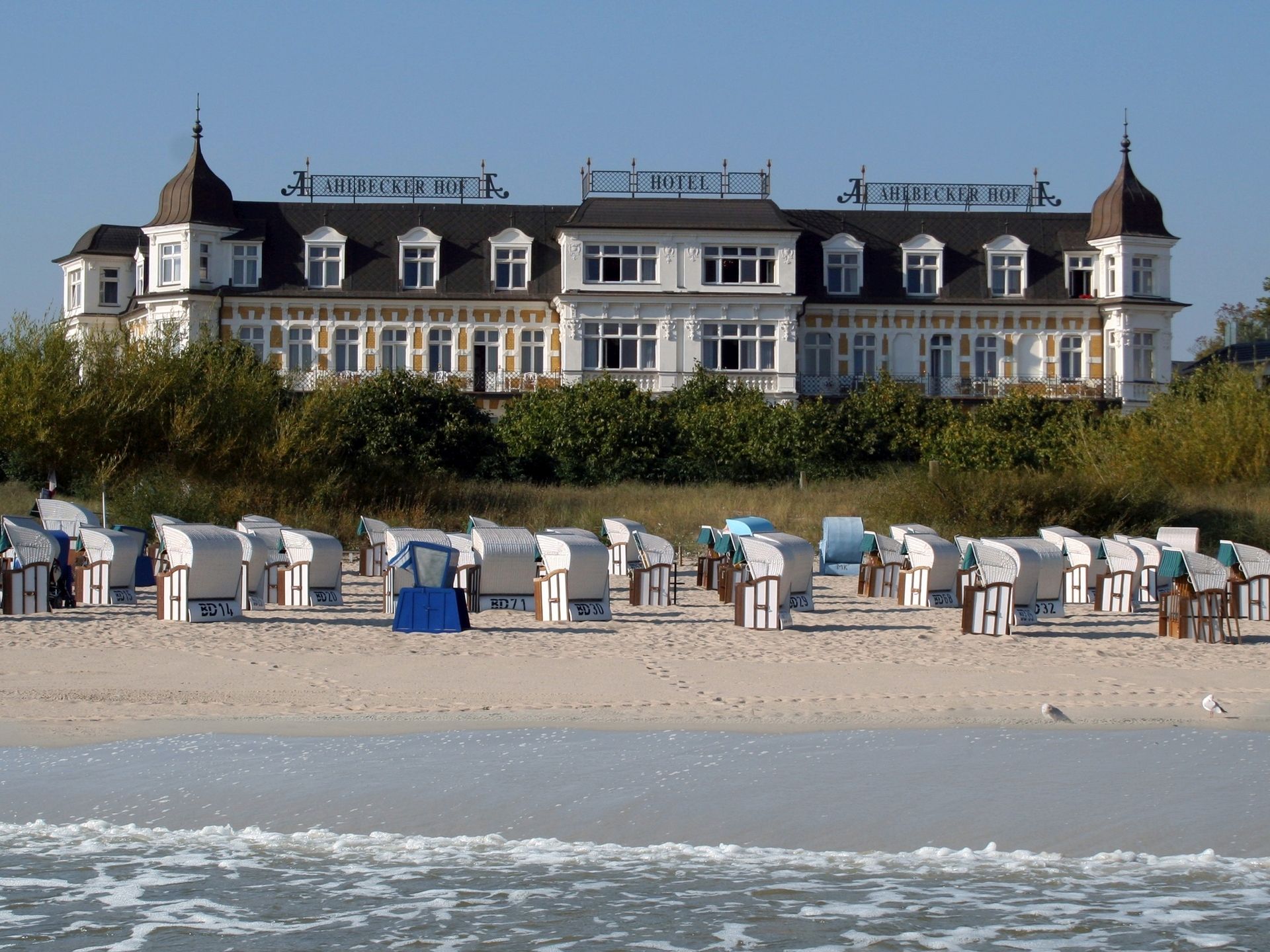The drama begins: Seetel to close three hotels in 8 hours if necessary
|
|
| According to the Federal Network Agency, the gas storage facilities are full. But does this apply nationwide at all times? And for how long? For entrepreneurs like Rolf Seelige-Steinhoff, all that remains here at the moment is a big if-then calculation. / Photo: adobe stock norn |
Bansin/Usedom (November 4, 2022). Three of the 16 resort hotels operated by Seetel Hotels in Germany are on the German Federal Network Agency's closure list. Owner and operator Rolf Seelige-Steinhoff is said to be standing by to close operations within 8 hours. The family-run company fears a chain reaction of the most negative kind: from millions in operating revenue losses to downgrades at the next credit inquiry to mouldy real estate next spring. Rolf Seelige-Steinhoff, a successful entrepreneur and excellent analyst, predicts here what could be in store. He too has been unable to obtain clear information from politicians.
Rolf, winter is just around the corner, the German gas shortage is still a problem for both consumers or companies, but three nuclear power plants will continue to run - until April. How cold will it be on Usedom from December to March? What lies ahead for Seetel Hotels?
In winter it can be very cold on Usedom - even ice floes float on the Baltic Sea. From December to the end of March, the German weather forecast site wetter.de puts the average daily minimum temperature at 0 or -1 degrees Celsius. Seetel Hotels operate 17 businesses on the island, hotel, and apartment hotels as well as restaurants; all businesses run on gas. There are no alternative energy sources on Usedom. We have zero clarity from politicians. No one points out that the nuclear power plants will only be on standby up to April; even the media don't always make this clear. What will happen from April? Is winter over on 1 April?
If Seetel Hotels are forced to reduce their gas consumption by just 20%, their business model will be severely compromised. We might survive the winter if we set the thermostate to a constant 10 degrees Celsius.
This could mean that hotels slide right into winter chaos. The energy crisis and inflation are catching service companies like ours at every level and right down to the last detail. The cost increases are dramatic, unfortunately also still dynamic and uncontrollable.
In addition, consumers are also taking fright: Seetel Hotels has already lost €1.2 million in revenue due to cancellations and the general uncertainty (gas levy, etc.) this October. A disaster! Though guests told me recently: The value for money in Usedom hotels is absolutely fine. As far as travellers see it: Everything is getting more expensive, even the beach chairs.
If I continue this thought into the future, then very soon I see that the market will shrink - on the supply side (hotels) as well as in demand (guests).
 |
|
| "Currently, the entrepreneurs of this country are no longer active guarantors of the economy, but only passive spectators of politics," says Rolf Seelige- Steinhoff. / Photo: SeetelHotels |
Please keep in mind, it's not just overnight stays that are lost, but also the day tourists. This means that the entire value chain is shrinking, and this is hitting the retail sector and many small businesses particularly hard. Logical: with limited services, good rates can no longer be achieved, occupancy drops and profitability collapses. All partners in the tourism value chain need each other.
Let's continue talking about the chain reaction. The Federal Network Agency, the highest federal authority in matters of electricity and gas, part of the Ministry of Economics, has a major influence on this. In our article from 29.7.2022 (see Link), we reported on the risk of possible shutdowns of individual businesses. The rumour of a "closure list" has also persisted since the summer. Does such a list exist, are Seetel Hotels affected?
Yes. In the area of the island of Usedom and its immediate surroundings, more than 50 companies are reportedly affected, all belonging to different industries - from feed distributors to supermarkets and hotels. As far as I know, three of our hotels are to be shut down: the Ahlbecker Hof, the Ostseehotel and the Hotel Kaiserstrand - and I also suspect that the recently opened Kinderresort will be among them.
What losses do you expect in the event of closures?
We did the maths for the first three hotels: Closure would mean a complete loss of revenue with fixed costs continuing: Per month, this would amount to between €280,000 and €500,000 per property. So, for a four-month closure, we're talking €3.36 to €6 million for the three properties.
What criteria are used to select the hotels that may be closed?
Only establishments whose gas consumption can be automatically and directly reported to the Federal Network Agency can be "identified". Businesses must also exceed 1.5 megawatt-hours of gas per year in their consumption. Such company information ends up in a portal and the companies are checked for their systemic importance.
What are the criteria for systemic importance?
Entrepreneurs are asked to indicate - on relatively short - checklists whether their company is, for example, relevant to public life, serves a social purpose or has an impact on society and the environment. Thus, an attempt is made to statistically record the consequences of a shutdown in a quick and general manner. I suspect that of the more than 50 companies on Usedom, not a single one is systemically important. By the way, companies facing the prospect of closure have to be available 24 hours a day so as to be in a position to receive the instruction "Attention, you now have 8 hours to shut down your hotel". If they're not, then they face significant consequences.
Currently, the entrepreneurs of this country are no longer active guarantors of the economy, but only passive spectators of politics. It is almost impossible to take on politics in the courts. Advice from lawyers here is frustrating.
In corona period, tourist businesses had to "shut down" as well. As everyone has known since then, this is not possible entirely, everything can only be reduced to a certain minimum. And even that can't be done in 8 hours. What’s the use of this time window? Even then, there must still be an emergency team in the hotel.
The scenarios have been run through by the Federal Network Agency. And the government has the right to intervene in the respective ownership rights in the gas crisis. The Federal Network Agency is required to secure the basic energy supply.
Does this list apply only to one region or destination or to the whole country? And where did you get this information?
The list exists for all regions throughout the country. Anyone can ask their regional gas network operator for it. Unlike pandemic closures, the individual German states have no say here; everything is determined at the federal level.
 |
|
| Idyllic normally also in winter - this year, however, the possible cold weather comes to the fore and how this will restrict the gas supply in the Seetel Hotels. / Photo: SeetelHotels |
And you don't have any energy alternatives?
No. Our hotel facilities are equipped with modern heating systems. Switching to oil heating or liquid gas does not usually work, because the tightly cut plots of land on the island do not even allow enough space for the tanks. We also do not have the structural engineering requirements for this. Fortunately, one hotel colleague on Usedom was able to switch from gas to oil because the capacity allowed it.
What other challenges would you face as an entrepreneur in the event of a closure?
There are some, but I would like to explain only two here, because they are very important. After corona, we would once again theoretically be forced to put the employees of the affected businesses on to short-time work, which would this time entitle them to only 60% of their salary. And now it would also hit the employer: We must pay all social contributions ourselves this time. If you can transfer employees to other hotels, that would obviously alleviate the situation.
But the consequences are this time completely different. For example, we have found that banks are not at all prepared for the deferred debt service payments that will accompany a closure. But even if it amounted to just an interest rate suspension, each hotel group would drop in bank ratings - and thus be ranked lower the next time it asked for credit.
What damage would the property suffer? Seetel Hotels is the owner and operator. What is the threat to owners/investors and operators in the building?
It starts with very simple questions. If we were to run into a supply shortage, greatly reduced gas volumes would mean that gas pressure could no longer be maintained in various lines. In the short term, a huge problem is developing here. Finally, what also happens when the closures are over, and we have to ramp up operations again? If hotel occupancy were to pick up immediately, the system could collapse.
The real catastrophe though would be the moisture in the building. Assuming the temperature stays at 10 degrees inside the shuttered hotels, or even a little below, we have correspondingly higher humidity. And the temperature, for example, due to solar irradiation, quickly rises and condenses the humidity in the plaster elements. This increases the risk that mould would develop. We won't know what the final effects of this black mould will be until the winter is over.
At some point, an expert will come - probably when the winter is over at the end of April. This means that the expert won’t show up on site until mid-June, after which we can approach workmen regarding the repairs. These repairs, in turn, are likely to be extensive because contaminated areas will have to be ripped out, renewed and properly disposed of in landfill... When everything is finished, it will be autumn 2023, we will have immense costs to bear, we will have to take out new loans and the German gas storage facilities will probably still be empty.
But we’ve done the maths beforehand: The damage from mould could cost €5,000 per room including the bathroom. With 300 rooms, the damage would run to €1.5 million.
Why do so few of your colleagues speak so openly and precisely about the plight of the hotel industry?
Politicians give the impression that we will have a mild winter. Colleagues probably rely on this. Many operators forget that, yes, they also need to communicate with the owner and find agreements. And I personally think the media landscape has totally failed. I can't understand why so much is not communicated.
Do you believe the government that the gas storage facilities in Germany are full?
Yes, we can see that every day on the homepage of the Federal Network Agency. But there are two problems. Firstly: The gas reserves are in the north, but if gas is needed in the south at short notice, we have a simple logistical problem: Gas cannot be transported any faster. And secondly: The gas storage volume is not sufficient to secure the increased demand in winter and receive new gas deliveries in the medium term.
Klaus Müller, Head of the Federal Network Agency, may have wanted to encourage people with his latest tweet on October 22, but he managed to do the opposite. His "confidence" contains the word "if" three times...quote: "The Federal Network Agency is confident, if industry and consumers save at least 20% gas and [if] the LNG terminals come on line [and if] there is no cold winter."
Many thanks for the interview, Rolf.



